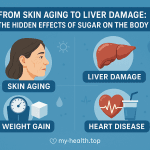This article is for informational purposes only and is not a substitute for professional medical advice.
Understanding Heart Health
Heart health is crucial for overall well-being. With cardiovascular diseases being the leading cause of death globally, focusing on what we eat can significantly impact our heart’s longevity and functionality. But which nutrients play a pivotal role in keeping our hearts healthy? The answer lies in understanding how these nutrients interact with our bodies to support cardiovascular function.
The Top 10 Nutrients for Heart Health
Here, we explore ten essential nutrients that contribute to heart health, providing practical tips on how to include them in your daily diet.
1. Omega-3 Fatty Acids
Omega-3 fatty acids are known for their anti-inflammatory properties and ability to lower triglyceride levels. Found in fatty fish like salmon, mackerel, and sardines, these healthy fats can help reduce the risk of heart disease. Studies have shown that individuals who consume omega-3s regularly have a lower incidence of heart attacks and strokes (PubMed). Aim for at least two servings of fatty fish each week. If you’re not a fish lover, consider flaxseeds, chia seeds, or walnuts as plant-based sources.
2. Fiber
Dietary fiber aids in lowering cholesterol levels and improving heart health. Soluble fiber, in particular, has been shown to reduce LDL cholesterol (the “bad” cholesterol) and is found in foods such as oats, beans, lentils, and fruits. For optimal heart health, aim for at least 25-30 grams of fiber each day. Start your day with a fiber-rich breakfast, such as oatmeal topped with berries, to kickstart your intake.
3. Antioxidants
Antioxidants, such as vitamins C and E, help combat oxidative stress in the body, which can lead to heart disease. Oxidative stress occurs when there’s an imbalance between free radicals and antioxidants in your body, potentially damaging blood vessels. Incorporate a variety of colorful fruits and vegetables into your meals, such as berries, oranges, and leafy greens, to boost your antioxidant intake. A simple mixed berry smoothie can be a delicious way to start your day.
4. Potassium
Potassium helps regulate blood pressure by balancing sodium levels in the body. High potassium intake is associated with lower blood pressure and reduced risk of stroke (CDC). Foods rich in potassium include bananas, sweet potatoes, spinach, and avocados. Strive for about 4,700 mg of potassium daily to support heart health. To increase your potassium intake, try adding a banana to your morning smoothie or including sweet potatoes in your dinner.
5. Magnesium
Magnesium plays a role in over 300 biochemical reactions in the body, including those that regulate heart rhythm. Low magnesium levels have been linked to an increased risk of heart disease (NHS). Nuts, seeds, whole grains, and leafy greens are excellent sources of magnesium. Aim for 310-420 mg per day, depending on your age and gender. A handful of almonds or a serving of quinoa can help you meet your daily magnesium needs.
6. Coenzyme Q10
Coenzyme Q10 (CoQ10) is a powerful antioxidant that may improve heart function and reduce blood pressure. It helps in the production of energy in cells and protects against oxidative damage. While your body produces CoQ10, you can also find it in foods like fatty fish, meat, and whole grains. Supplements are available, but consult with a healthcare provider before starting, especially if you are on medications for heart disease.
7. Folate
Folate, or vitamin B9, is essential for reducing homocysteine levels, a risk factor for heart disease. Homocysteine is an amino acid that, at elevated levels, can damage blood vessels. Leafy greens, beans, and fortified cereals are great sources of folate. Aim for 400 mcg daily to support cardiovascular health. A spinach salad topped with chickpeas and a lemon vinaigrette can be both nutritious and delicious.
8. Vitamin D
Vitamin D is crucial for overall health, including heart health. Low levels of vitamin D have been associated with an increased risk of heart disease. While sunlight is a natural source, you can also find vitamin D in fatty fish and fortified foods. Aim for 600-800 IU daily, and consider a supplement if your levels are low, especially during winter months when sunlight exposure is limited.
9. Vitamin K
Vitamin K helps prevent calcium from accumulating in the arteries, thus supporting heart health. It plays a crucial role in blood clotting and maintaining strong bones. Green leafy vegetables, such as kale and spinach, are rich in vitamin K. Aim for adequate intake through a varied diet. A kale salad with a citrus dressing is a tasty way to boost your vitamin K levels.
10. Polyphenols
Polyphenols, found in foods like dark chocolate, berries, and green tea, have been linked to improved heart health. They help reduce inflammation and improve blood vessel function. Research suggests that polyphenols can enhance endothelial function, which is vital for maintaining blood flow (UpToDate). Incorporate these foods into your diet for a delicious way to support your heart. A cup of green tea or a small square of dark chocolate can be a heart-healthy treat.
Incorporating Nutrients into Your Diet
Now that you know the key nutrients for heart health, how can you easily incorporate them into your meals? Here are some practical tips:
- Plan balanced meals: Aim to include a source of protein, healthy fats, and plenty of fruits and vegetables in every meal. For example, a grilled chicken breast with quinoa and steamed broccoli makes a well-rounded meal.
- Snack smart: Choose heart-healthy snacks like nuts, yogurt, or fruit instead of processed options. A handful of walnuts or an apple with almond butter can satisfy cravings while supporting heart health.
- Experiment with recipes: Try new recipes that highlight these nutrients, such as quinoa salads or smoothies packed with leafy greens and berries. Consider meal prepping to ensure you have healthy options readily available.
Patient Vignette
Meet Sarah, a 52-year-old woman who recently became more conscious of her heart health. After a routine check-up revealed elevated cholesterol levels, she decided to revamp her diet. By incorporating more omega-3 fatty acids through salmon, increasing her fiber intake with oats and beans, and adding a variety of colorful fruits and vegetables, Sarah noticed a significant drop in her cholesterol levels within three months. She feels more energetic and is proud of her commitment to a heart-healthy lifestyle. Sarah’s story illustrates how dietary changes can have a profound impact on heart health.
Myth vs. Fact
| Myth | Fact |
|---|---|
| All fats are bad for heart health. | Healthy fats, like those found in avocados and nuts, are essential for heart health. |
| Taking supplements can replace a healthy diet. | While supplements can help, they should not replace whole foods, which provide a range of nutrients. |
| Heart disease only affects older adults. | Heart disease can affect individuals of all ages, making it important to maintain a healthy lifestyle early on. |
| All carbohydrates are unhealthy. | Whole grains and fiber-rich carbohydrates are beneficial for heart health, while refined carbs can be detrimental. |
FAQs
What are the best foods for heart health?
Foods rich in omega-3 fatty acids, fiber, antioxidants, and potassium are excellent for heart health. Examples include fatty fish, whole grains, fruits, and vegetables.
How much fiber should I eat for heart health?
Adults should aim for 25-30 grams of fiber daily to help lower cholesterol and support heart health.
Can I get enough nutrients from supplements?
While supplements can help, it’s best to obtain nutrients from a balanced diet rich in whole foods. Supplements may not provide the same benefits as whole foods.
What lifestyle changes can improve heart health?
Incorporating regular exercise, maintaining a healthy weight, and reducing stress can significantly improve heart health. Aim for at least 150 minutes of moderate exercise each week.
Is it too late to improve heart health?
No, it’s never too late to make positive changes. Adopting a heart-healthy diet and lifestyle can lead to improvements at any age.
Key Takeaways
- Omega-3 fatty acids and fiber are crucial for heart health.
- Incorporate a variety of fruits and vegetables for antioxidants.
- Potassium and magnesium help regulate blood pressure.
- Coenzyme Q10 may improve heart function.
- A balanced diet can significantly lower heart disease risk.
References
- PubMed: Omega-3 Fatty Acids and Cardiovascular Disease
- WHO: Healthy Diet
- CDC: Heart Disease Facts
- NHS: Dietary Recommendations for Heart Health
- UpToDate: Nutritional Management of Heart Disease
- American Heart Association: Dietary Guidelines for Heart Health








Post a comment